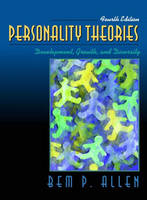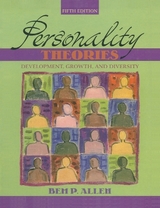
Personality Theories
Routledge (Verlag)
978-0-205-34050-7 (ISBN)
- Titel erscheint in neuer Auflage
- Artikel merken
Organized by individual theorists, this comprehensive text examines the major movements in the field through an historic and humanistic approach.
Allen begins each chapter with teaser questions that help frame the chapter that the student is about to read. The questions are answered in the body of the chapter and are later reinforced through the use of summary points and essay/critical thinking questions at the end of each chapter, which aid in the continuation of a discussion about the content.
In addition, Allen provides a tabular format: a running comparison between the major theorists that allows students to analyze new theories with respect to theories learned in previous chapters. The unique style of Allen's book is strengthened through his conversational tone, allowing students to easily grasp an understanding of the key people and movements in the field of personality.
Each chapter concludes with “Evaluations,” “Conclusions,” “Summary Points,” “Running Comparison,” “Essay/Critical Thinking Questions,” and “E-mail Interaction.”
Preface.
Introduction.
Preliminary Definition of Personality.
Methods of Studying Personality.
Personality Tests: Personologists Tools.
Testing and Theorizing About Personality in a World of Human Diversity.
A Final Word About “Science.”
Chapter Sections.
Occasional Sections.
2. The Psychoanalytic Legacy: Sigmund Freud.
Freud, the Person.
Freud's View of the Person.
Basic Concepts: Freud.
3. Personalitys Ancestral Foundation: Carl Jung.
Jung, the Person.
Jung's View of the Person.
Basic Concepts: Jung.
4. Overcoming Inferiority and Striving for Superiority: Alfred Adler.
Adler, the Person.
Adler's View of the Person.
Basic Concepts: Adler.
5. Moving toward, away from, and against Others: Karen Horney.
Horney, the Person.
Horney's View of the Person.
Basic Concepts: Horney.
6. Personality from the Interpersonal Perspective: Harry Stack Sullivan.
Sullivan, the Person.
Sullivan's View of the Person.
Basic Concepts: Sullivan.
7. The Seasons of Our Lives: Erik Erikson.
Erikson, the Person.
Erikson's View of the Person.
Basic Concepts: Erikson.
Theoretical and Empirical Support for Eriksons Point of View.
8. The Sociopsychological Approach to Personality: Erich Fromm.
Fromm, the Person.
Fromm's View of the Person.
Basic Concepts: Fromm.
9. Every Person Is to Be Prized: Carl Rogers.
Rogers, the Person.
Rogers' View of the Person.
Basic Concepts: Rogers.
10. Becoming All That One Can Be: Abraham Maslow.
Maslow, the Person.
Maslow's View of the Person.@AHEADS = Basic Concepts: Maslow.
11. Marching to a Different Drummer: George Kelly.
Kelly, the Person.
Kelly's View of the Person.
Basic Concepts: Kelly.
Personality Development.
12. The Social-Cognitive Approach to Personality: Walter Mischel and Julian Rotter.
Mischel: A Challenge to Traits.
Mischel, the Person.
Mischel's View of the Person.
Basic Concepts: Mischel.
Conclusions.
Rotter: Internal versus External Control of Behavior.
Rotter, the Person.
Rotter's View of the Person.
Basic Concepts: Rotter.
13. Thinking Ahead and Learning Mastery of Ones Circumstances: Albert Bandura.
Bandura, the Person.
Bandura's View of the Person.
Basic Concepts: Bandura.
14. It's All a Matter of Consequences: B. F. Skinner.
Skinner, the Person.
Skinner's View of the Person.
Basic Concepts: Skinner.
15. Human Needs and Environmental Press: Henry A. Murray.
Murray, the Person.
Murray's View of the Person.
Basic Concepts: Murray.
16. The Trait Approach to Personality: Raymond Cattell and Hans Eysenck.
Cattell, the Person.
Cattell's View of the Person.
Basic Concepts: Cattell.
Eysenck: 16 = 3—Conceiving of Personality in Three Dimensions.
Eysenck, the Person.
Eysenck's View of the Person.
Basic Concepts and Contributions: Eysenck.
Eysenck's Last Word.
Limitations.
17. Personality Development and Prejudice: Gordon Allport.
Allport, the Person.
Allport's View of the Person.
Basic Concepts: Allport.
Personality Development.
Personality and Prejudice.
Glossary.
References.
Names Index.
Subject Index.
Appendix: Where is Personality Going?
| Erscheint lt. Verlag | 26.7.2002 |
|---|---|
| Verlagsort | New York |
| Sprache | englisch |
| Maße | 243 x 182 mm |
| Gewicht | 962 g |
| Themenwelt | Geisteswissenschaften ► Psychologie ► Psychoanalyse / Tiefenpsychologie |
| ISBN-10 | 0-205-34050-4 / 0205340504 |
| ISBN-13 | 978-0-205-34050-7 / 9780205340507 |
| Zustand | Neuware |
| Haben Sie eine Frage zum Produkt? |
aus dem Bereich



